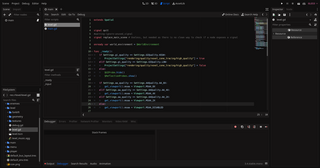Related Research Articles
In computing, a compiler is a computer program that translates computer code written in one programming language into another language. The name "compiler" is primarily used for programs that translate source code from a high-level programming language to a low-level programming language to create an executable program.

Lisp is a family of programming languages with a long history and a distinctive, fully parenthesized prefix notation. Originally specified in the late 1950s, it is the second-oldest high-level programming language still in common use, after Fortran. Lisp has changed since its early days, and many dialects have existed over its history. Today, the best-known general-purpose Lisp dialects are Common Lisp, Scheme, Racket, and Clojure.
Pascal is an imperative and procedural programming language, designed by Niklaus Wirth as a small, efficient language intended to encourage good programming practices using structured programming and data structuring. It is named after French mathematician, philosopher and physicist Blaise Pascal.

Scheme is a dialect of the Lisp family of programming languages. Scheme was created during the 1970s at the MIT Computer Science and Artificial Intelligence Laboratory and released by its developers, Guy L. Steele and Gerald Jay Sussman, via a series of memos now known as the Lambda Papers. It was the first dialect of Lisp to choose lexical scope and the first to require implementations to perform tail-call optimization, giving stronger support for functional programming and associated techniques such as recursive algorithms. It was also one of the first programming languages to support first-class continuations. It had a significant influence on the effort that led to the development of Common Lisp.

A shell script is a computer program designed to be run by a Unix shell, a command-line interpreter. The various dialects of shell scripts are considered to be command languages. Typical operations performed by shell scripts include file manipulation, program execution, and printing text. A script which sets up the environment, runs the program, and does any necessary cleanup or logging, is called a wrapper.
Cocoa is Apple's native object-oriented application programming interface (API) for its desktop operating system macOS.
Bytecode is a form of instruction set designed for efficient execution by a software interpreter. Unlike human-readable source code, bytecodes are compact numeric codes, constants, and references that encode the result of compiler parsing and performing semantic analysis of things like type, scope, and nesting depths of program objects.
Object Pascal is an extension to the programming language Pascal that provides object-oriented programming (OOP) features such as classes and methods.

GNU Screen is a terminal multiplexer: a software application that can be used to multiplex several virtual consoles, allowing a user to access multiple separate login sessions inside a single terminal window, or detach and reattach sessions from a terminal. It is useful for dealing with multiple programs from a command line interface, and for separating programs from the session of the Unix shell that started the program, particularly so a remote process continues running even when the user is disconnected.

Object REXX is a high-level, general-purpose, interpreted, object-oriented (class-based) programming language.

GNU Ubiquitous Intelligent Language for Extensions is the preferred extension language system for the GNU Project and features an implementation of the programming language Scheme. Its first version was released in 1993. In addition to large parts of Scheme standards, Guile Scheme includes modularized extensions for many different programming tasks.
Scheme In One Defun, or humorously Scheme In One Day (SIOD) is a programming language, a dialect of the language Lisp, a small-size implementation of the dialect Scheme, written in C and designed to be embedded inside C programs. It is notable for being perhaps the smallest practical implementation of a Lisp-like language. It was written by George J. Carrette originally. It is free and open-source software released under a GNU Lesser General Public License (LGPL).
In computer science, bootstrapping is the technique for producing a self-compiling compiler – that is, a compiler written in the source programming language that it intends to compile. An initial core version of the compiler is generated in a different language ; successive expanded versions of the compiler are developed using this minimal subset of the language. The problem of compiling a self-compiling compiler has been called the chicken-or-egg problem in compiler design, and bootstrapping is a solution to this problem.

Racket is a general-purpose, multi-paradigm programming language. The Racket language is a modern dialect of Lisp and a descendant of Scheme. It is designed as a platform for programming language design and implementation. In addition to the core Racket language, Racket is also used to refer to the family of programming languages and set of tools supporting development on and with Racket. Racket is also used for scripting, computer science education, and research.

Chicken is a programming language, specifically a compiler and interpreter which implement a dialect of the programming language Scheme, and which compiles Scheme source code to standard C. It is mostly R5RS compliant and offers many extensions to the standard. The newer R7RS standard is supported through an extension library. Chicken is free and open-source software available under a BSD license. It is implemented mostly in Scheme, with some parts in C for performance or to make embedding into C programs easier.

Samuel Hocevar is a French software and video game developer. He was the project leader of the Debian operating system from 17 April 2007 to 16 April 2008, and one of the founding members of Goatse Security.

In computing, a script is a relatively short and simple set of instructions that typically automate an otherwise manual process. The act of writing a script is called scripting. Scripting language or script language describes a programming language that is used for scripting.
Tcl is a high-level, general-purpose, interpreted, dynamic programming language. It was designed with the goal of being very simple but powerful. Tcl casts everything into the mold of a command, even programming constructs like variable assignment and procedure definition. Tcl supports multiple programming paradigms, including object-oriented, imperative, functional, and procedural styles.
References
- ↑ Hocevar, Sam. "COPYING". Sam Hocevar's homepage. Retrieved 28 May 2015.
- ↑ Jonathan Rees (1991). "Scheme implementations" . Retrieved 2009-06-11.
- ↑ Oliver Laumann and Carsten Bormann (1994). "Elk: The Extension Language Kit". USENIX Computing Systems. 7 (4).
- ↑ Elk webpage , retrieved 2024-10-19